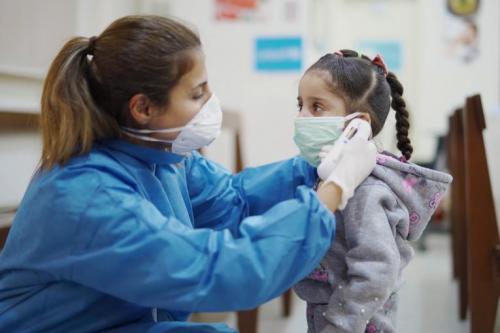Geneva Palais briefing note on the impact of COVID-19 on children
This is a summary of what was said by UNICEF Director of the Office of Global Insight and Policy Laurence Chandy – to whom quoted text may be attributed – at today's press briefing at the Palais des Nations in Geneva.
“People around the world are anxiously tracking the numbers of new cases and deaths due to COVID-19. But in doing so, we are distracted from the catastrophic effects of the pandemic on children. The effects of the pandemic are not limited to health but extend to many dimensions of children's lives: their education, safety and poverty. And these effects are largely attributable not to the virus but to the mitigation measures governments have taken, which in some settings, may inadvertently do more harm than good.

“We have all read or seen footage of overwhelmed health services in countries from China, to Italy, to the US. We've seen less footage of schools around the world that today are all empty. Or of child protection services that have been asked to close their doors.
“It is important to look at the effects of the pandemic in all its dimensions. I would particularly emphasize the economic dimension because of the severity of the global recession we now find ourselves in. The IMF reported earlier this week that 170 countries are expected to see average income levels fall this year. For poor households around the world, a reduction in income means reductions in essential expenditures on health and food, whose effects are especially grave for children in households who struggle to subsist day to day.
“It is hard to fathom the effects of 1.5 billion children around the world having their education disrupted or put on pause altogether. The effect on children’s safety is alarming too, with children from families with a history of domestic violence now restricted to their homes. We will sadly learn more about this over time.
“The health effects of the pandemic extend far beyond the virus itself. Immunization campaigns globally are on hold. The global campaign to end polio could be set back years. 23 countries have put measles inoculation programmes on hold. Poor households, who are forced to cut back their spending on health and food are especially at risk of worse health outcomes for their children. We anticipate hundreds of thousands of additional child deaths this year. Progress towards the Sustainable Development Goals for children were already off track. The fear now is that the targets will be entirely out of sight. We desperately need to avoid that outcome.
“To do so, we need to have more information when determining what measures to put in place in a given setting, broadening the focus beyond the narrow count of new cases and new deaths. An optimal response to COVID-19 requires balancing multiple risks to save the most lives. We need solidarity – we need to stop competing for resources and we need to start working together to minimize the pandemic's effects. Children can serve as a rallying point because we all care for children and because they can be incredibly powerful actors and forces for change in their own right. And we need action.
"In the immediate term, steps are needed to shield poor families by expanding social assistance, securing food markets that are at risk of disruption, and adapting physical distancing and lockdown measures that risk causing more loss of life by forcing poor people to abandon their livelihoods.
“Throughout the proceeding months, we call on governments to prioritize the continuity of child services and make sure access to those services is equal. This includes classifying child protection as an essential service. There is a need for specific protection measures for vulnerable children. While this is a universal crisis, its effects will not be equally distributed. Child refugees and migrants, displaced children, children with disabilities, minorities, slum dwellers and those living in institutions, will be disproportionately affected without compensating measures. More support is needed for parents and caregivers, to help them handle stress and the stress faced by their children, and to support their children's education.
"Finally, as we look ahead to the next phase of the pandemic, we call on governments to prioritize the restoration of child services as lockdown measures are lifted, and to ensure that children have access to treatment, testing and vaccines as they become available.”
Source: United Nations Children's Fund
- 245 reads
Human Rights
Ringing FOWPAL’s Peace Bell for the World:Nobel Peace Prize Laureates’ Visions and Actions

Protecting the World’s Cultural Diversity for a Sustainable Future

The Peace Bell Resonates at the 27th Eurasian Economic Summit

Declaration of World Day of the Power of Hope Endorsed by People in 158 Nations

Puppet Show I International Friendship Day 2020

